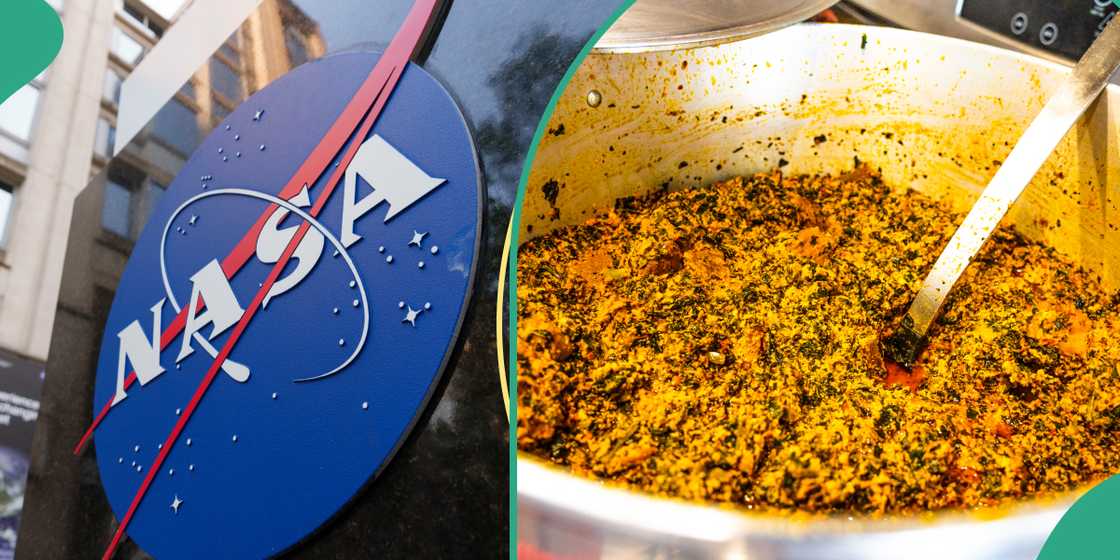Why NASA Scientists Chose Egusi Over Ogbono, others for Space Exploration
- Egusi seeds have become the first Nigerian object in orbit, launched on NASA’s Crew-11 mission led by Dr. Temidayo Oniosun
- Dr. Oniosun explained egusi was chosen over other Nigerian soups for its strong cultural symbolism and pan-Nigerian appeal
- The experiment aims to test egusi’s resilience in space, sparking playful speculation about one day feeding aliens with the iconic soup
CHECK OUT: How to Start Earning with Copywriting in Just 7 Days – Even if You’re a Complete Beginner
Egusi, the beloved West African melon seed, has become Nigeria’s first cultural export to orbit, and it could one day end up on an alien dining table, according to Dr. Temidayo Oniosun, Founder and Managing Director of Space in Africa.
Speaking on Channels TV, Dr. Oniosun explained that egusi was deliberately chosen over other iconic Nigerian soups such as ogbono or fisherman soup for its deep cultural significance.

Source: Getty Images
“I think that Egusi is the most cultural dish in Nigeria,” he said.
“Everybody eats Egusi. The Yorubas claim it came from them, the Igbos also say it’s theirs. There isn’t a better dish that says ‘I’m Nigerian’ than Egusi. Even Nigerians abroad instantly connect to it, and it’s popular across West Africa too.”
Melon seeds aboard NASA spacecraft
The seeds, launched aboard NASA’s Crew-11 mission on a SpaceX Falcon 9 rocket to the International Space Station (ISS), mark the start of a broader experiment aimed at testing their resilience in extreme space conditions. Dr. Oniosun noted this is only the beginning:
“We’re going to send more stuff to space in the future. For people curious about other soups, dishes, or seeds, we’re definitely planning ahead.”
When asked, perhaps jokingly, if the initiative was partly designed to offer egusi to extraterrestrials, Oniosun did not dismiss the idea.
“Yeah, that’s a possibility,” he admitted.
“Some people have asked what happens to the seeds. Maybe we’ll bring them back and plant them — who knows what they’ll turn into? That’s why we’re doing these experiments. It’s very exciting.”
The project, led by Space in Africa, highlights Nigeria’s growing ambition to carve out a presence in space research, particularly in space agriculture.

Read also
“This analysis get K-Leg”: Okon of Lagos predicts coalition’s fate without Peter Obi as its candidate
Scientists hope that understanding how Nigerian crops respond to microgravity could open up new prospects for sustainable food systems beyond Earth.
Oyo government reacts to development
The Oyo state government has celebrated the selection of the native Egusi seed for an interstellar exploration.
In a post on its Facebook page, the government asserts that the historic development "is the first time an agricultural product native to Nigeria will reach the International Space Station, and it originates from Oyo State’s soil."

Source: Getty Images
It added:
"When the seeds return to Earth, Dr Oniosun will lead post-flight experiments in partnership with leading plant biotechnologists at the University of Florida and molecular researchers in Brazil, exploring how space travel affects crop resilience, genetic expression, and viability."
NASA shares how moon will partially block sun
Earlier, Legit.ng reported that a partial solar eclipse is set to take place on March 29, affecting various regions where the Moon will obscure part of the Sun.

Read also
Wike’s aide dares Charly Boy after Lagos is no man's land comments: “Old man wey no get sense”
According to the National Aeronautics and Space Administration (NASA), this phenomenon occurs when the Moon gradually moves across the Sun, partially blocking its light.
Source: Legit.ng



